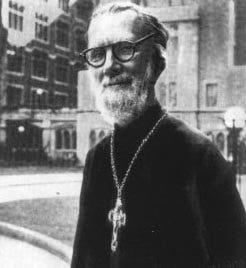It may be perfectly true, as I personally believe is the case, that our contemporary culture or civilization is "on trial." But should Christians, as Christians, be concerned with this cultural crisis at all? If it is true, as we have just admitted, that the collapse or decline of culture is rooted in the loss of faith, in an "apostasy" or "retreat," should not Christians be concerned, primarily if not exclusively, with the recon- struction of belief or a reconversion of the world, and not with the salvaging of a sinking civilization? Fr. Georges Florovsky, Christianity and Culture (pub. 1974)
You’ll often hear that we live in a “Post-Christian world,” a smug phrase that means many things to many people. Leaving aside the degree to which this is true, the tenor of Christian engagement with the world (the cosmos) has undoubtedly changed dramatically since the beginning of the 20th century; although my well-read audience will know that in the common streets, blogs, and social media haunts of our day we are more likely to hear of Christians’ engagement, or lack thereof, with this or that culture.
God bless the culture warriors with silence! I imagine many terribly sensible people saying. Well, steady on (don’t worry, I’m not even close to getting to the point).
Now, I recently read through T.S. Eliot’s Notes Towards a Definition of Culture, a perfectly fine little book with its share of new perspectives on tried and true insights of the past. After finishing it, however, I walked away feeling more likely to buy a pair of cufflinks and take up pipe smoking than rededicating myself to God and Beauty.
But so it was that just a few evenings ago that, through the unholy Youtube algorithm, God sent me an obscure lecture on the relationship between the late Fr. Georges Florovsky and the late Fr. Alexander Schmemann, of blessed memory. As I kicked the soccer ball against my backyard fence to rhythm of the self-assured, learned musings of the Ukrainian lecturer, a number of thoughts dawned, or perhaps more accurately, redawned on me with some force.
Christians have already grappled with all the concerns explored in Silver Door
Many of them were and are considerably more learned than me
They had strong disagreements with one another
I recognize that none of this is terribly profound, and while intellectual humility can often be wielded as a weapon, it is essential for getting anything done.
So it was that after listening to this lecture that I went through Fr. Florovsky’s works and quickly focused in on his Christianity and Culture, a collection of essays by the Russian theologian and historian.
Over the coming weeks I’ll walk through this book, drawing insights and lessons that may be helpful to today’s poets and artists. As an older pagan convert to Orthodox Christianity I’m looking forward to engaging with the work of a recent thinker from my newly adopted tradition who believed it was essential that we establish a “theology of culture.”
I’ll leave you with a second excerpt from the beginning of Fr. Florovsky’s book:
At certain times, and in certain historical situations, the mystery of Redemption seems to obscure the mystery of Creation, and Redemption is construed rather as a dismissal of the fallen world than as its healing and recovery. The radical opposition between Christianity and Culture, as it is presented by certain Christian thinkers, is more inspired by certain theological and philosophical presuppositions than by an actual analysis of culture itself. There is an increasing eschatological feeling in our days, at least in certain quarters. There is also an increasing devaluation of man in the con- temporary thought, philosophical and theological, partly in reaction to the excess of self-confidence of the previous age. There is a re-discovery of human "nothingness," of the essential precariousness and insecurity of his existence, both physical and spiritual. The world seems to be inimical and empty, and man feels himself lost in the flux of accidents and failures. If there is still any hope of "salvation," it is constructed rather in the terms of "escape" and "endurance" than in those of "recovery" or "reparation." What can one hope for in history?



Looking forward to your explication.
I recently finished reading TS Eliot's Notes Towards a Definition of Culture as well, which brought a lot of clarity to how discussions of culture should be framed, as I'd always found that many people use the word without any clear definition of its meaning! If I could recommend some other reading on the subject The Death of Christian Culture, and it's sequel, The Restoration of Christian Culture by John Senior are brilliant. I'll definitely check out Fr. Florovsky.